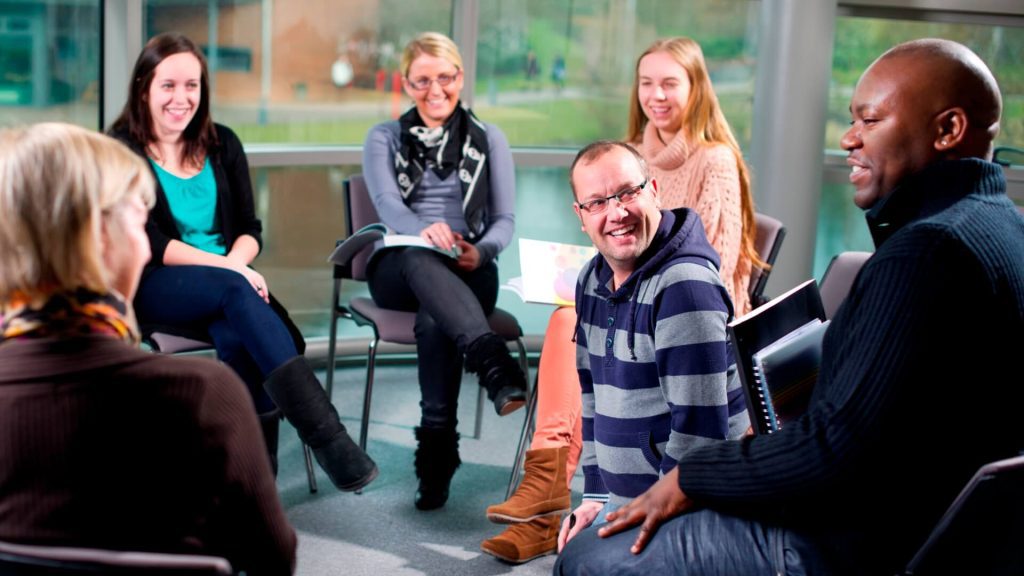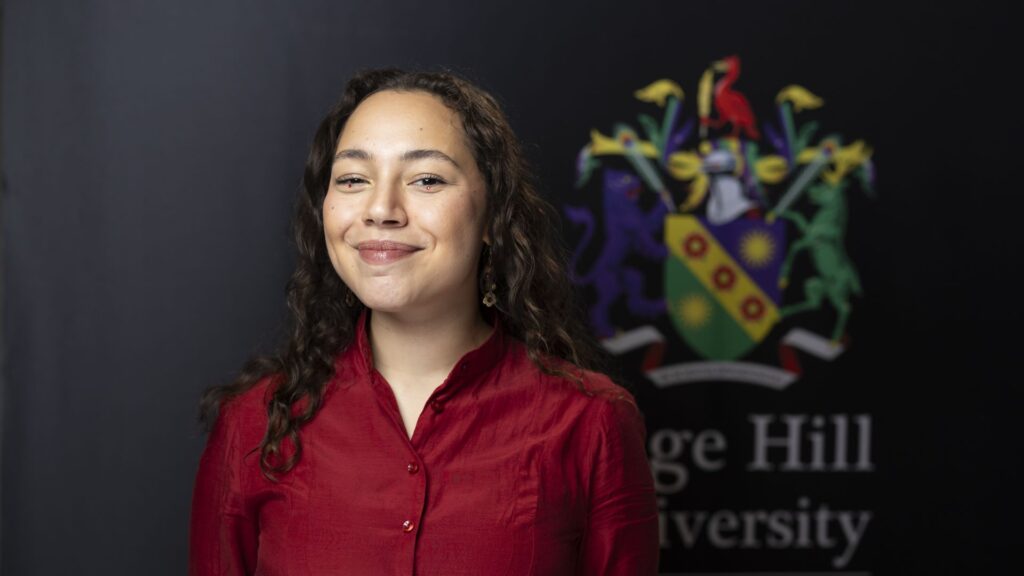Person Centred Experiential Counselling and Psychotherapy MA
Gain experience with real clients using a person centred experiential (PCE) model of therapy. Develop your emotion focused abilities, empathic listening, and transferable skills that are useful across many counselling-related careers.
Overview
| Course length: | 2 years full-time 3 years part-time |
|---|---|
| Start dates: | September 2024 September 2025 |
| Location: | Edge Hill University |
| Subject(s): | Counselling and Psychotherapy |
| Faculty: | Health, Social Care and Medicine |
| Department: | Allied Health, Social Work and Wellbeing |

Provide therapeutic support to real life clients as you develop empathic listening abilities through the person centred experiential model of therapy on this MA Person Centred Experiential Counselling and Psychotherapy programme.
Learning through experience and developing emotion focused abilities is key. Practice experience will take place through our established network of providers and gives first-hand, supportive experience of working in this sector. Support will always be provided through supervision both from tutors on the programme and your individual external supervisor.
There will also be a focus and encouragement towards self awareness, exploration and personal development. A financial contribution of £600 is provided to support with your own individual therapy and an additional £600 is provided towards your external practice supervision.
With increased self awareness, emotional insight, empathic responsiveness, and relational competencies working alongside others in a helping relationship, you will have developed a range of transferable skills that are important in a range of careers. You may wish to work in a counselling-related profession within education, health, community, or other public and private sectors.
Please note that you will be required to become a student registered member of a professional membership organisation that holds an accredited register with the Professional Standards Authority; for example, the British Association for Counselling and Psychotherapy, at a cost to yourself. You will also be required to have suitable indemnity insurance in place for your clinical placement.
Course features
-
Professional practice placements
-
International students can apply
What you'll study
Start practising your counselling with support from students and staff. They’ll work collaboratively with you and offer constructive feedback. Key aspects of this year are self-awareness and emotional insight. Through personal development sessions, you’ll learn the importance of being in groups, encountering and learning with others, and becoming more emotionally aware. Theory around person centred experiential counselling will inform your practice. You’ll also study research skills to prepare for the final-year dissertation.
Offer individual therapy to real clients, whilst being supervised in practice-based learning groups, learning experientially with students and collaboratively with tutors. You’ll explore your own emotional process in relation to the issues clients present in therapy, and learn how to adapt your responses in order to meet their needs. In all modules, there’s an experiential approach to practice-based learning. And weekly personal development groups will provide a learning space for exploring your own emotional awareness. There is also a dissertation module, where you will work collaboratively with your individual supervisor, to complete a practice based related piece of research.
Where your course includes optional modules, these are to provide an element of choice within the course curriculum. The availability of optional modules may vary from year to year and will be subject to minimum student numbers being achieved. This means that the availability of specific optional modules cannot be guaranteed. Optional module selection may also be affected by timetabling requirements. Some restrictions on optional module choice or combinations of optional modules may apply.
How you'll study
The programme will be typically delivered as one long day per week.
The person centred experiential (PCE) learning approach will be a consistent focus throughout the programme.
Upon working with real life clients during the programme, you will need to allocate time for client work. You will also need to factor in seeing your external supervisor for a minimum of an 1.5 hours per month.
How you'll be assessed
You will be assessed using a variety of approaches including counselling practice audio and video recordings, vivas, presentations, student led seminars and written assignments.
There are no formal written examinations as part of the current assessment methods on this programme.
Who will be teaching you
You will be taught by a range of person centred experiential (PCE) practitioners and tutors who have a breadth of practice-based experience. You will also have the opportunity to listen to guest speakers and visiting lecturers, expanding your knowledge further.
The programme team are research active, with specific interests in person-centred experiential therapy.
Entry criteria
Entry requirements
You will be expected to have achieved a minimum qualification of a 2:1 honours degree in either counselling and/or psychotherapy or a cognate discipline. This may include education; nursing; social work; psychology; sports; community arts; or programmes that have a focus on supporting and developing individual growth and expression.
Consideration will be given to applications from students with lower classifications, or non-standard qualifications, depending on your recent practice based experience (normally, within the last five years). Practice based experience is likely to include significant previous experience of working emotionally with clients from vulnerable populations experiencing issues with emotional and mental wellbeing. In this instance, you may be asked to also produce evidence of ability to study at Masters level.
Ideally, you will have some experience of working with clients from vulnerable populations, experiencing issues related to emotional and mental wellbeing. This experience can be in a voluntary or paid capacity.
Consideration will also be given if you are an international student with equivalent academic qualifications or professional qualification and/or experience.
Recognition of prior learning, where we accept a previous qualification as meeting the learning outcomes for a course or module, will not be accepted.
An interview and reflexive statement will form part of the selection process. The reflexive statement will require you to detail your personal and emotional reasons around wanting to study to become a person centred experiential counsellor/psychotherapist.
You will also be required to apply for a Disclosure and Barring Service (DBS) Enhanced Disclosure indicating that they meet the mandatory criteria of ‘Clearance to Work with Children and/or Vulnerable Adults’.
English language requirements
International students require IELTS 6.5, with a score no lower than 6.0 in each individual component, or an equivalent English language qualification.
If your current level of English is half a band, one band, or one-and-a-half bands lower, either overall or in one or two elements, you may want to consider our Pre-Sessional English course.
How to apply
There is an online application process for this course.
Please choose the application form for your preferred intake date and mode of study.
Please see our international student pages for further information about how to apply as a prospective international student.
Should you accept an offer of a place to study with us and formally enrol as a student, you will be subject to the provisions of the regulations, rules, codes, conditions and policies which apply to our students. These are available at www.edgehill.ac.uk/studentterms.
There’s plenty of opportunities to come take a look around campus. Attend one of our open days to see what life at Edge Hill University is all about.
Book an open day
Facilities
The Faculty of Health, Social Care and Medicine offers outstanding facilities for the education and training of health and social care professionals. 
The contemporary teaching and learning resources include leading edge clinical skills facilities, an 860-seat lecture theatre, and a variety of teaching rooms and social learning spaces.
Where you'll study
Faculty of Health, Social Care and Medicine
Finance
Tuition fees
UK Full-Time
£9,000
a year
UK Part-Time
£50 per credit
a year
International
£16,500
a year
EU/EEA and Swiss students who have settled or pre-settled status under the EU Settlement Scheme, as well as Irish nationals, may be eligible for the UK tuition fee rate.
Financial support
Please view the relevant Money Matters guide for comprehensive information about the financial support available to eligible UK students joining postgraduate courses at Edge Hill University.
EU/EEA and Swiss students who have settled or pre-settled status under the EU Settlement Scheme may be eligible to apply for financial support. Irish nationals can ordinarily apply to Student Universal Support Ireland (SUSI). If you are an EU student who does not have settled or pre-settled status, or are an international student from a non-EU country, please see our international student finance pages.
Your future career
You’ll graduate from this MA Person Centred Experiential Counselling and Psychotherapy with the skills and expertise you need to enter practice as a psychotherapist. You’ll have the individual therapy experience employers are looking for. You will also have developed a range of transferable skills that are important in a range of careers. You may wish to work in a counselling-related profession within education, health, community, or other public and private sectors.
You can explore options in wellbeing and mental health services, the third sector, and the corporate world. Possible career areas include roles within:
- NHS
- charities
- employee assistance and wellbeing programmes
- youth justice
- social care
- probation
- pastoral support in schools
- advocacy and special educational needs
- health and social welfare
- leadership and workforce development










